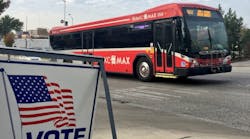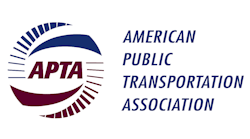Voting for the U.S. general election has been happening for weeks, but Nov. 3 is the final day to cast a valid ballot. As of the evening of Nov. 2, more than 97.7 million early ballots have already been cast for the U.S. general election, which represents nearly 71 percent of the total votes counted in the 2016 election.
Besides the presidential election and possible control of Congress, voters will have their say on 16 transit ballot initiatives in various parts of the U.S.
The American Public Transportation Association (APTA) and APTA’s Center for Transportation Excellence held a press call last week outlining transit’s successes at the ballot box so far in 2020 and what voters will decide on Nov. 3.
Public transportation has won 94 percent (32 out of 34) of elections this year, including what APTA called the “biggest successful measure of the year” in a Hamilton County, Ohio, sales tax that will provide $100 million in annual funding for public transit in the Cincinnati metro area.
“Year after year, voters across the country have overwhelmingly voiced their support for investing in more public transportation,” said APTA President and CEO Paul P. Skoutelas. “The local and state initiatives on the ballot on Nov. 3 are vital to improve and expand public transit services, to spur economic development and job creation, and to connect communities and the people who live in them. These ballot initiatives once again underscore the importance of local, state and federal partnerships in public transportation investment.”
On Nov. 3, there are 16 measures representing more than $38 billion in funding being considered by voters. APTA and the Center for Transportation Excellence highlighted some of the measures, including:
- Prop A in Austin, Texas, which would make critical investments in bus and rail to manage Austin’s urban growth while providing hundreds of millions of dollars for community-led anti-displacement measures;
- Measure 26-218 in Portland, Ore., which would fund a large slate of transportation, transit and safety improvements throughout the region to address historically inadequate transportation planning;
- The Gwinnett transit referendum in Gwinnett County, Ga., which would bring Metropolitan Atlanta Rapid Transit Authority service, including light rail, bus rapid transit and expanded bus service, to Gwinnett County.
- Prop A in San Antonio, Texas, which would allow VIA Metropolitan Transit to continue to operate at its best capacity during the pandemic and beyond;
- Measure RR in San Francisco, San Mateo and Santa Clara Counties, Calif., which would provide the first dedicated source of funding for Caltrain;
- Prop 1 in Seattle, Wash., which would renew a tax that funds bus service and subsidized pass programs for students and other groups; and,
- The Mountain Line mill levy increase in Missoula, Mont., which would, among other improvements, fund Missoula’s innovative Zero Fare program.
“This is a change election and voters are tired of neglecting the core infrastructure that makes our communities go. Now is the time to invest,” said Josh Cohen, executive director of APTA’s Center for Transportation Excellence. “Voters understand that supporting transit isn’t just about transit, it’s about greater equity, access to jobs and education, support for frontline workers and first responders and investment in a sustainable, clean environment.”
He continued, “The success of public transit at the ballot box has been a testament to innovation, thoughtfulness and the collaboration of the plans themselves. These measures improve access and frequency to bus and rail, fund anti-displacement initiatives, make sidewalks and bike lanes safer — they’re bold and demonstrate voters’ hopes for the future.”

Mischa Wanek-Libman | Group Editorial Director
Mischa Wanek-Libman is director of communications with Transdev North America. She has more than 20 years of experience working in the transportation industry covering construction projects, engineering challenges, transit and rail operations and best practices.
Wanek-Libman has held top editorial positions at freight rail and public transportation business-to-business publications including as editor-in-chief and editorial director of Mass Transit from 2018-2024. She has been recognized for editorial excellence through her individual work, as well as for collaborative content.
She is an active member of the American Public Transportation Association's Marketing and Communications Committee and served 14 years as a Board Observer on the National Railroad Construction and Maintenance Association (NRC) Board of Directors.
She is a graduate of Drake University in Des Moines, Iowa, where she earned a Bachelor of Arts degree in Journalism and Mass Communication.



